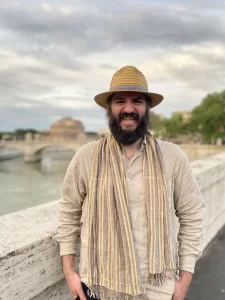
Mark L. Tizzoni
Assistant Professor of Classical and Medieval Studies
Associations
Classical and Medieval Studies
History
About
Mark Lewis Tizzoni is an Assistant Professor of Classical and Medieval Studies and History, specializing in late antique and medieval studies. Tizzoni earned a B.A. in History and Latin at the University of Scranton and an M.A. and Ph.D. in Medieval Studies at the University of Leeds. Tizzoni’s teaching focuses on the history of a broader, more globally-defined Middle Ages that centers Africa in wider Mediterranean and Afro-Eurasian worlds. Course offerings consider the Mediterranean world broadly, but give particular attention to the Maghreb, the Horn of Africa, West Africa, and the Iberian peninsula.
Tizzoni’s research focuses on the transformation of the Roman world in the fifth through seventh centuries CE. He is particularly interested in questions of identity, social cohesion, and how cultural production can be used to help understand and navigate times of drastic social change (such as those witnessed in the aftermath of the Roman Empire in North Africa). As an interdisciplinary cultural historian, Tizzoni employs late antique Latin poetry to engage with these questions, focusing on the collections that have survived from sixth-century North Africa and seventh-century Iberia. He is currently writing an open-access book with Kısmet Press entitled The Maghreb in Late Antiquity.
Before coming to Bates in 2020, he taught pre-modern African, Iberian, and United States history at Angelo State University in San Angelo, TX and worked as a professional horticulturalist in Northeastern Pennsylvania.
Recent Publications:
“Christianity in Roman Africa, I: Communities and Religious Movements,” with Éric Fournier. In Handbook of African Christianity from Apostolic Times to the Present, ed. by Andrew Barnes and Toyin Falola. Palgrave Macmillan, 2024.
“Review: Caroline Goodson, Cultivating the City in Early Medieval Italy,” Speculum, 98.4 (2023) https://doi.org/10.1086/726871.
“Locating Carthage in the Vandal Era.” In Urban Interactions: Communication and Competition in Late Antiquity and the Early Middle Ages, ed. by Michael Burrows and Michael J. Kelly. Gracchi Books, 2020.
“Teachers and Teaching,” with Sarah B. Lynch. In Cultural History of Education in the Middle Ages, ed. by Jo Ann H. Moran Cruz. Bloomsbury, 2020.
“Isidore’s early influence and dissemination (636-711).” In A Companion to Isidore of Seville, ed. by Andrew Fear and Jamie Wood. Brill, 2020.
Forthcoming Publications:
“Alterity in the Anthologia Latina: Gender, Race, and the (Patriarchal) State in Vandal Carthage.” In The Vandal Renaissance, ed. by Richard Miles et al. Brill, forthcoming.
“Between Originality and Classical Tradition: the Ars Poetica of Eugenius II of Toledo,” in Transforming the Early Medieval World: Studies in Honour of Ian N. Wood, edited by N. Kıvılcım Yavuz and Richard Broome. Kısmet Press, forthcoming.
“Constructing Culture and Community in Post-Roman Carthage: Rereading the Anthologia Latina.” In A Companion to North Africa During the Vandal Century, ed. by Éric Fournier. Brill, forthcoming.
“Poetic, epistolary, and scribal culture.” In A Companion to Visigothic Iberia, ed. by Damián Fernández, Molly Lester, and Jamie Wood. Brill, forthcoming.
“Seeking female experience in the verse of Vandal-era Carthage.” In Women and Gender in Late Antiquity, ed. by Maijastina Kahlos and Éric Fournier. Brepols, forthcoming.
“Transforming the Late Antique Curriculum: Eugenius of Toledo and Educational Culture in Visigothic Iberia,” in Reading Eugenius of Toledo, ed. Graham Barrett and David Ungvary. Publications of the Journal of Medieval Latin. Brepols, forthcoming.
Expertise
Current Courses
Winter Semester 2026
Race Reception and the Modern Creation of the Ancient and Medieval Past
This course is designed to introduce students to the ways in which the study of the classical and medieval worlds has been constructed alongside, and as an integral part of, modern systems of colonialism, racism and white supremacy. It aims, likewise, to introduce students to the ways in which the d…
Colonization and Resistance in Late Antique North Africa
While treated by some scholars as peripheral, North Africa was and is a central arena in global history. This course examines the Maghreb in the dynamic period of transformation that saw the Roman Empire devolve into separate political and social entities, ca.200-700 C.E. In these critical centuries…
Senior Thesis
Required of all majors, the thesis involves research and writing of an extended essay in classical and medieval studies, following the established practices of the field, under the guidance of a supervisor in the classical and medieval studies program. Students register for CMS 458 in the winter sem…
Senior Thesis
The research and writing of an extended essay in history, following the established practices of the discipline, under the guidance of a departmental supervisor. Students register for HIST 458 in the winter semester. Majors writing an honors thesis register for both HIST 457, 458. Prerequisite(s): H…
Fall Semester 2026
Trans-Saharan Africa in the Middle Ages
This course examines the early history of trans-Saharan Africa from roughly 600-1600 CE. During this period, new ideas, new political structures, and a new religion—Islam—united West Africa and the Maghreb in new, profound, ways. This dynamic era saw the formation of powerful, Islamic empires. S…
Elementary Latin I
This introduction to the Latin language through a study of its vocabulary, forms, and syntax emphasizes the connection between Latin and English grammar and etymology and presents Roman cultural concepts as evident in Latin vocabulary. The course concentrates on Latin-English translation, with some …